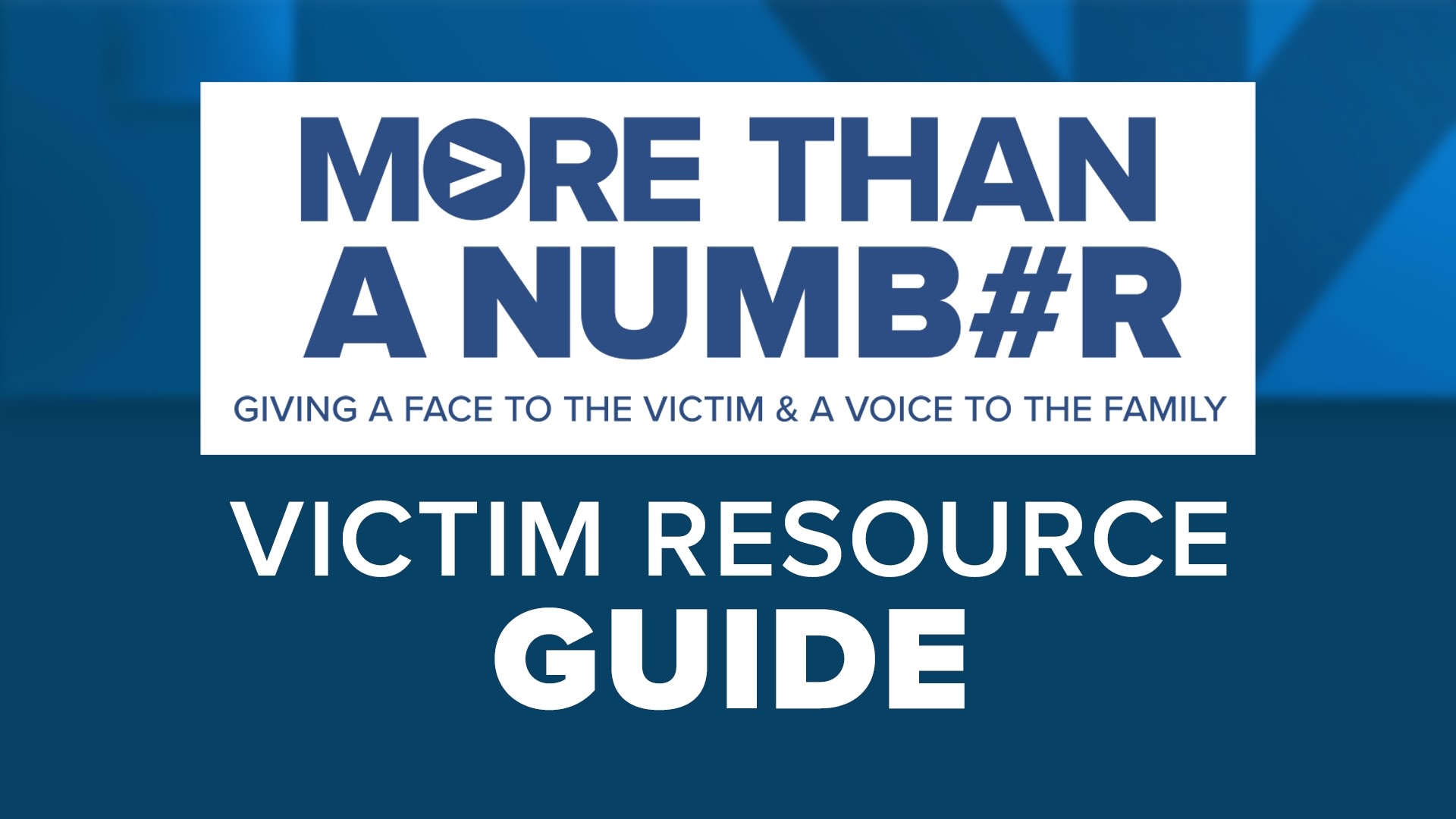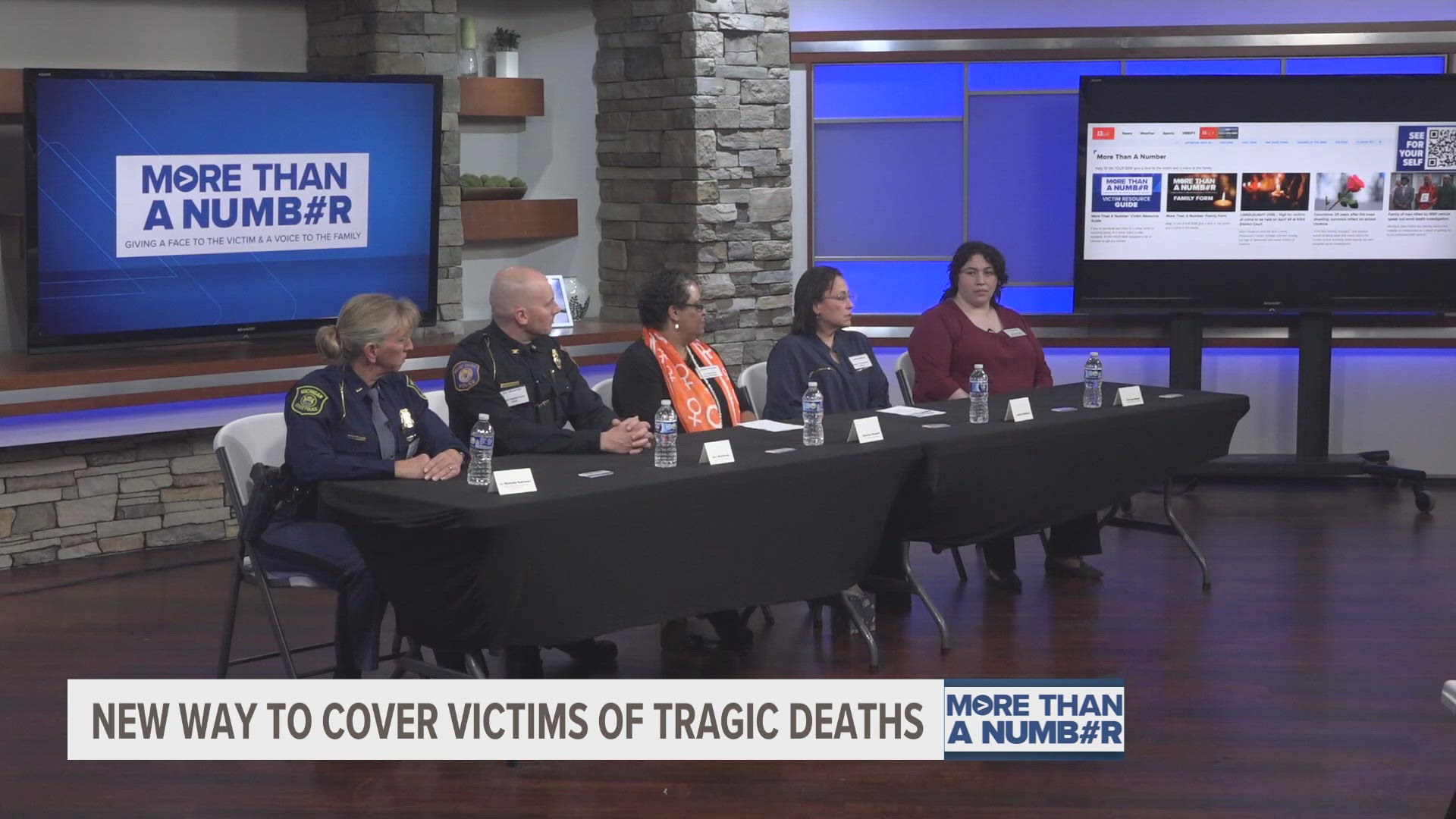More Than A Number: Victim Resource Guide
If you or someone you know is a crime victim or surviving family of a crime, there is help available. 13 ON YOUR SIDE compiled a list of services to get you started.

What is More Than A Number?
More Than A Number is a commitment to compassionately cover the victims of tragedy or violent crime and give a voice to their survivors.
We want to humanize victims and avoid the negative stereotypes that often accompany traditional crime coverage.
More Than A Number is a project started by 13 ON YOUR SIDE sister station WMAZ in Macon, Georgia.
It's the work of Justin Baxley through his Poynter-Koch Media and Journalism Fellowship. Victim's advocacy is especially personal for Justin, who lost his father in a robbery.
Justin went through a horrifying experience when someone shot and killed his father Michael Baxley, and it inspired him to take a different approach to how journalists report on victims of tragedies.
"Within two hours of me finding out, I received five phone calls asking me for an interview, and I would say I'm not ready yet, and they'd call back in an hour and say, are you ready now," he recalled.
"Overwhelmed and a lack of empathy and a lack of compassion for what I'd gone through, and it was like I had to be beholden to their 24-hour news cycle," Justin said.
Justin wishes he had talked to the media after his father's murder. But he wasn't ready when reporters wanted to talk to him. He believes someone with information might have come forward if he had shared his father's story in the days after his death.
The More Than A Number initiative allows families and loved ones of victims to open up about them on their own time.
13 ON YOUR SIDE hosts a West Michigan Homicide Memorial Page for those homicide victims in our community. It serves as a reminder of the lives lost and the families impacted by the violence.
We also provide a resource guide that can get you started with insurance, crime scene cleanup, counseling options and how to get help with groceries.
The First Steps
This may seem obvious, but after receiving traumatic news we can forget to reach out to other loved ones. A suggestion is to designate point people to help spread the message faster. That way those closest to the victim aren't the only ones tasked with contacting other loved ones.
If your family member was killed in their home or car, you don't have to suffer the trauma of cleaning up that crime scene.
There are companies that specialize in cleaning up crime scenes.
Most standard homeowner's insurance policies include some coverage for biohazard cleanups in the event of a death. These types of policies will help you pay for the cost of cleaning blood, stains and odors.
If you're not sure if your policy covers trauma cleanups, you're encouraged to contact your insurance adjuster.
Another step to take following the death of your loved one is to notify their employer if they were working at the time of their death. You can ask about benefits, any pay that may be due including vacation and sick time, as well as disability and any life insurance policies.
Additional documents you may need:
- Death certificate (get multiple copies)
- Life insurance policy information
- Social Security information
- Homeowners Insurance
- Victim’s will
Victim's Rights in Michigan
Michigan state law considers you a victim if you suffer direct or threatened physical, financial, or emotional harm as the result of the commission of a crime.
If you are the victim of a crime, you have the following rights:
- Be treated with fairness and respect for their dignity and privacy;
- Be informed of the steps in the criminal justice process;
- Be notified of all proceedings in the case; and
- Attend all court proceedings.
You can see the full list of victim rights here.
Crime Victim Compensation How to apply
Michigan's Crime Victim Compensation program can help you pay out-of-pocket medical expenses, lost earnings, funeral bills, counseling or other expenses for people who have been harmed as the result of a crime.
Crime Victim Compensation is the payer of last resort. That means you should use private insurance or other public funds first to be eligible for compensation.
Examples of covered crimes:
- Homicide
- Robbery
- Assault
- Carjacking
- Hate Crime
- Kidnapping
- Child Abuse
- Domestic Violence
- Sexual Assault
- Human Trafficking
- Stalking
- Elder Abuse
- DWI/DUI
- Terrorism/Mass Violence
Types of expenses covered
Michigan's Crime Victim Compensation program has a maximum award limit of $45,000.
- Medical expenses: Up to $45,000 aggregate
- Nonmedical remedial treatment: Up to $45,000 aggregate
- Psychological counseling: 35 sessions, 20 family sessions
- Accessibility and rehabilitative equipment: Up to $45,000 aggregate
- Relocation: $3,800
- Residential security: Up to $1,000
- See the complete list here.
Eligibility requirements
Here is a list of requirements to make sure you meet before you apply:
- An individual must be emotionally, physically, psychologically, or mentally injured as a direct result of a crime.
- If the victim is a minor, deceased, or mentally incapacitated, a claimant can file a claim for expenses incurred as a result of the victim’s injuries.
- A victim who experiences a crime that inflicts bodily harm – including pregnancy or death – or a reasonably perceived or actual threat of injury or death under the laws of the United States, State of Michigan, federally recognized Tribal land, or in another state where the crime committed would be considered a crime under Michigan law.
- An act of international terrorism committed outside the territorial jurisdiction of the United States would also be considered eligible.
- The crime must be reported to law enforcement (waivers may apply).
- If the crime was a sexual assault, then a sexual assault forensic exam may be used in lieu of reporting to police.
- The victim or claimant must cooperate with law enforcement officials in the investigation and prosecution of the case (waivers may apply).
- Cannot be criminally responsible/an accomplice to the crime or involved in misconduct that contributed to the injury at the time of the crime.
- At least $200 of out-of-pocket loss(es) OR at least five (5) days of lost wages or support.
- File a claim within five years from the date of injury or discovery (waivers may apply).
- Seek reimbursement from other sources (health insurance, Medicaid, short/long term disability, etc.) before applying for compensation benefits.
How to apply
To apply, you'll need to share your Social Security number, date of birth, and a copy of the police report if you have it.
A victim's advocate can help you navigate this process and help you get all of the paperwork you need to submit.
If you’re not sure who your victim advocate is, contact your local county prosecutor by clicking here.
Applications should be sent via email. Email completed applications to MDHHS-MichiganCrimeVictim@Michigan.gov or fax them to 517-335-2439. Applications can still be submitted via mail to:
Michigan Department of Health and Human Services
Division of Victim Services
Crime Victim Services Commission
Grand Tower, Suite 1113
235 South Grand Avenue, PO Box 30037
Lansing MI 48909
Click here for more information about how to submit your application.
State of Michigan Services Victim Advocates offer a variety of help
Michigan Victim Advocacy Network
The Michigan Department of Health and Human Services has a division dedicated to victim services.
This network supports advocates in their practice of trauma-informed response when dealing with survivors, victims and their families.
The Michigan Victim Advocacy Network has a large resource library for various types of crimes, including homicide, kidnapping, sexual assault and more.
Michigan State Police Victim Services Program
Michigan State Police's Victim Services Program offers victim advocates across the statute of Michigan.
Because of limited staff, Victim Advocates from this program only work with victims of Michigan State Police cases.
Troopers handling cases will refer victims to advocates.
Contact Information for Victim Advocates:
MSP First District Headquarters serving the Lansing Post
Ms. Jessica Espinoza
Phone: 517-599-9178
MSP First District serving the Brighton Post
Ms. Megan Calamita
Phone: 810-529-0260
MSP Second District serving the Metro North Post
Ms. Gina Hofer
Phone: 248-392-8087
MSP Second District serving the Metro South Post
Ms. Christina Black
Phone: 734-691-1933
MSP Third District serving the Flint Post
Ms. Ronisha Kibler
Phone: 810-516-5767
MSP Third District serving the Tri-City Post
Ms. Rebecca Holm
Phone: 989-824-1794
MSP Fifth District Headquarters serving the Paw Paw Post
Ms. Morgan Gwilliams
Phone: 269-762-3855
MSP Fifth District serving the Marshall Post
Ms. Magan Smith
Phone: 269-406-1379
MSP Sixth District serving the Lakeview Post
Ms. Jen Zamarron
Phone: 989-287-0750
MSP Sixth District Headquarters serving the Grand Rapids Post
Ms. Elena DeYoung
Phone: 616-240-0078
MSP Seventh District serving the Traverse City Post
Ms. Mindy Hill
Phone: 231-492-2666
MSP Seventh District serving the Gaylord Post
Ms. Megan Beckett
Phone: 989-619-3349
MSP Eighth District serving the Iron Mountain Post
Ms. Karla Lehmann
Phone: 906-282-4779
MSP Eighth District serving the Negaunee Post
Ms. Amanda Wetelainen
Phone: 906-458-3928
Helpful links and resources to track criminal cases
Other resources:
- Address Confidentiality Program: 313-456-0110
- Clergy Abuse & Boy Scouts of America: 517-241-3001
- Criminal Child Support: 517-335-7560
- Domestic Violence/Sexual Assault: 517-927-2957
- Elder Abuse: 517-335-7560
- General Criminal Questions: 517-388-9451
- Hate Crimes/Domestic Terrorism: 313-456-0040
- Human Trafficking: 313-456-0131
Victim Services by County
While there are many organizations and services on the national and state level here to help you, some find it easier to work with victim advocates in their communities.
Select a county to find services near you:
Ready to share your story? Here's how to contact us
With your help, we'd like to share who your loved one was with others in West Michigan.
When you are ready, please share photos, memories and other details about your loved one. You can do that by completing our online form below.
Thank you for taking the time to share and allowing us to help share your story with others.
More Than A Number
More Than A Number is a Poynter-Stand Together award-winning project created by Justin Baxley designed to help families of loved ones impacted by tragedy and trauma interact with journalists in a less intrusive way.
More Than a Number is a commitment to compassionately cover the victims of tragedy or violent crime and give a voice to their survivors.
We want to humanize victims and avoid the negative stereotypes that often accompany traditional crime coverage.
If you have questions or concerns, you can email us at news@13onyourside.com.
►Make it easy to keep up to date with more stories like this. Download the 13 ON YOUR SIDE app now.
Have a news tip? Email news@13onyourside.com, visit our Facebook page or Twitter. Subscribe to our YouTube channel.
Watch 13 ON YOUR SIDE for free on Roku, Amazon Fire TV Stick, Apple TV and on your phone.


